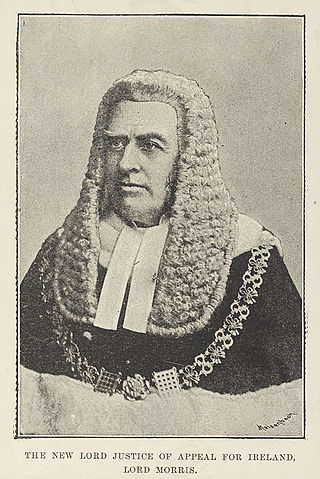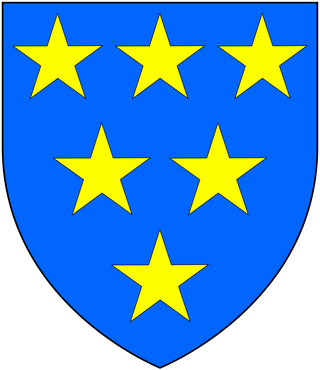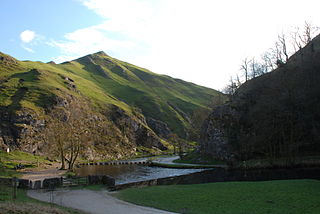
The Attorney-General for Ireland was an Irish and then United Kingdom government office-holder. He was senior in rank to the Solicitor-General for Ireland: both advised the Crown on Irish legal matters. With the establishment of the Irish Free State in 1922, the duties of the Attorney-General and Solicitor-General for Ireland were taken over by the Attorney General of Ireland. The office of Solicitor-General for Ireland was abolished at the same time for reasons of economy. This led to repeated complaints from the first Attorney General of Ireland, Hugh Kennedy, about the "immense volume of work" which he was now forced to deal with single-handedly.
Sir Nicholas White was an Irish lawyer, judge, privy councillor and government official during the reign of Elizabeth I.
Sir William Ryves (1570–1647) was a barrister and judge, and a member of a distinguished Dorsetshire family. He enjoyed a successful legal career in Ireland, holding office as Attorney-General for Ireland and as a justice of the Court of King's Bench (Ireland). For a time he acted as Deputy to the Lord Chancellor of Ireland.
Sir Gerard Lowther (1589–1660), sometimes referred to as Gerald Lowther, was a member of the well-known Lowther family of Westmoreland. He had a distinguished judicial career in Ireland, becoming Chief Justice of the Irish Common Pleas, although his enemies claimed his success was due to a complete lack of moral principles.
Patrick Barnewall was a leading figure in the Irish Government of the 1530s and 1540s. He owed his position largely to his close links with Thomas Cromwell. He sat in the Irish House of Commons as MP for County Dublin, and held the offices of Solicitor General for Ireland and Master of the Rolls in Ireland. Today he is mainly remembered for his role in founding the King's Inns. He belonged to a junior branch of the family of Lord Trimlestown: his own descendants held the title Viscount Barnewall of Kingsland.
Barnaby Skurloke or Skurlock was a prominent and politically influential lawyer in Ireland in the mid-sixteenth century. He held the office of Attorney General for Ireland, and was the first holder of the office to be so described. He was for a short time the acting Lord Chief Justice of Ireland. In later life, he became a leading opponent of the Crown's policies and was imprisoned as a result.
Sir Richard Osbaldeston was an English barrister who became Attorney General for Ireland. He was the great-grandfather of Richard Osbaldeston, Bishop of London.
Sir Lucas Dillon, also called Luke, was a leading Irish barrister and judge of the Elizabethan era who held the offices of Attorney General for Ireland and Chief Baron of the Irish Exchequer. He supported the Lord Deputy Henry Sidney in the cess controversy and the Lord Deputy John Perrot in the Desmond Rebellions. He was held in high regard by Queen Elizabeth, but was accused by his enemies of corruption and maladministration.
Thomas St. Lawrence, also called Thomas Howth (c.1480–1553) was a leading statesman and judge in sixteenth-century Ireland. He held the offices of Attorney General for Ireland and justice of the Court of King's Bench (Ireland) and was a member of the Privy Council of Ireland. He is remembered today mainly for his efforts to save the life of John Alen, Archbishop of Dublin, who was murdered during the Rebellion of Silken Thomas. He was also noted for his opposition to the Reformation. The latter stance led to a bitter clash with the leading Protestant reformer John Bale, Bishop of Ossory. The St Lawrence family were Barons and later Earls of Howth, hence his alternative name, Thomas Howth.
Edward Fitz-Symon was a leading Irish barrister and judge of the Elizabethan era. He held the offices of Attorney General for Ireland and Serjeant-at-law (Ireland) and was very briefly Master of the Rolls in Ireland. Despite his appointment to these senior offices, he was derided by his contemporaries as being a man of "mean learning". His family were Lords of the Manor of Baldoyle for several generations.
John Keppock was an Irish judge of the late fourteenth century, who held the offices of Lord Chief Justice of Ireland, Chief Baron of the Irish Exchequer and Deputy Lord Chancellor of Ireland. He became a politician of some importance.

Sir Nicholas Walsh (1542–1615) was an Irish judge, politician and landowner of the late Tudor and early Stuart era. He was Speaker of the Irish House of Commons in the Parliament of 1585–86 and a close ally of the Lord Deputy of Ireland, Sir John Perrot. Perrot's downfall did some short-term damage to Walsh's career, but he soon regained his influence, as he was noted for his loyalty to the English Crown, and enjoyed the Queen's personal regard.
Robert Preston, 1st Baron Gormanston was an Anglo-Irish nobleman, statesman and judge of the fourteenth century. He held several senior judicial offices including, for a brief period, that of Lord Chancellor of Ireland. He was the founder of the leading Anglo-Irish Preston family whose titles included Viscount Gormanston and Viscount Tara.
William le Petit, Petyt, or Lepetit was an Irish judge who was very briefly Lord Chief Justice of Ireland. He is chiefly notable for having been pardoned for homicide.

Thomas Dowdall, also spelt Dowdale, Douedall, or Dowedall, was an Irish barrister and judge who held the office of Master of the Rolls in Ireland.
Sir John Everard was an Irish barrister, politician and judge. He was notable as the last Irish judge until the reign of James II to openly profess the Roman Catholic faith. His religious beliefs eventually led to his enforced resignation from the Bench in 1607.

Geoffrey Osbaldeston (1558-c.1635) was an English-born politician and judge who had a long but rather undistinguished career in Ireland.
Gerald Comerford (c.1558–1604), was an Irish barrister, judge and statesman of the late sixteenth and early seventeenth centuries. He sat in the House of Commons in the Irish Parliament of 1585–6, and briefly held office as Chief Justice of Munster and as a Baron of the Court of Exchequer (Ireland). He profited from his close family association with the Earl of Ormond. Comerford rose rapidly in the public service to become a trusted servant of the English Crown, and would probably have become one of the dominant political figures in the southeast of Ireland had it not been for his early death.
Sir Robert Dillon of Newtown near Trim was an Irish judge of the Tudor era. He served as Chief Justice of the Irish Common Pleas for more than twenty years, despite repeated calls for his removal on the grounds of age and ill health.
William Hilton was an Irish politician, barrister and judge. He is now mainly remembered for his family connection to James Ussher, Archbishop of Armagh, whose sister Anne he married, and who furthered his career.